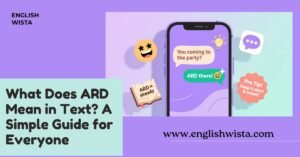Have you ever received a message from a friend that said something like “YK I didn’t mean it that way” or “It’s fine, YK how it is sometimes”? If you found yourself staring at your screen wondering, “What on earth does YK mean?”, you’re not alone.
The internet has created its own language short, punchy abbreviations that make texting faster and sometimes more fun. But if you’re not familiar with every new slang term, it can be confusing. Don’t worry we’re here to make it easy.
In this article, we’ll explore what “YK” means in text messages and social media, how people use it, when it’s appropriate to say it, and how you can use it confidently too. We’ll look at real-life examples, explain variations, and even share some fun facts about how this small abbreviation became part of modern communication.
So, grab your phone, imagine you’re texting a friend, and let’s break down the mystery behind “YK.”
What Does “YK” Mean in Text?
Let’s start with the basics. “YK” stands for “you know.”
That’s it! It’s short, simple, and something you probably say in everyday conversation without even realizing it. When people type YK, they’re just shortening “you know” to save time or to sound more casual and conversational.
Here’s how it works in real life:
- Instead of writing: “You know I can’t come tonight.”
You can write: “YK I can’t come tonight.”
It carries the same meaning it’s just shorter and feels more relaxed.
Texting is all about speed and tone, and “YK” helps people sound friendly, natural, and less formal.
Why Do People Use “YK” in Texts?
You might wonder: why not just type “you know”? Why bother with “YK”?
The main reason is convenience. Short forms like YK make texting faster. People type it when they want to sound casual, when they’re in a hurry, or when they’re chatting in an informal setting.
But there’s also something about tone. Using abbreviations like “YK” makes a message feel friendly and conversational almost like speaking face-to-face.
Here are a few common reasons people use “YK”:
- To make a point softer or more personal:
“It’s not a big deal, YK?”
(This sounds gentler than just saying “It’s not a big deal.”) - To connect with someone:
“We used to hang out all the time, YK?”
(It adds a feeling of shared understanding.) - To fill a pause in conversation:
Just like how people say “you know” when thinking, they text “YK” for the same reason.
In short, YK isn’t just an abbreviation it’s a tone marker that shows friendliness or emotion.
Is “YK” Formal or Informal?
“YK” is completely informal.
It’s perfect for texting friends, chatting on social media, or leaving comments, but not suitable for professional or academic writing.
Imagine emailing your boss and saying:
“YK I finished the report.”
That would look odd and unprofessional. Instead, in formal writing, you’d say:
“As you know, I finished the report.”
So, here’s a quick guide:
✅ Use YK
- In text messages with friends
- On social media (Instagram, Twitter/X, Snapchat, TikTok)
- In casual group chats
❌ Avoid YK
- In work emails
- In academic essays or reports
- In professional messages
Think of “YK” as part of your texting vocabulary, not your formal vocabulary.
Common Ways to Use “YK” in Sentences
The meaning of YK doesn’t change much, but the tone can shift depending on where you place it in a sentence. Let’s look at a few examples.
1. At the beginning of a sentence:
This version sets up what you’re about to say like you’re letting someone in on your thought.
- “YK, I really didn’t expect that movie to be so good.”
- “YK, it’s been a long week.”
2. In the middle of a sentence:
This version keeps the tone flowing naturally, as if you’re speaking casually.
- “I’m kinda tired, YK, from all the studying.”
- “Things have been weird lately, YK, since he moved.”
3. At the end of a sentence:
This version makes it sound like you’re seeking agreement or understanding.
- “That was pretty rude, YK?”
- “I just didn’t feel like going, YK?”
In all three cases, YK adds warmth and familiarity like you’re making sure the other person understands how you feel.
What Are Some Similar Abbreviations to “YK”?
There are many other short forms used in texting that express similar tones or help with casual conversation. Here are a few related abbreviations:
- IK: “I know”
Example: “IK right? That’s what I said too!” - LOL: “Laughing out loud”
Example: “That was so funny LOL.” - IDK: “I don’t know”
Example: “IDK if I can make it tonight.” - TBH: “To be honest”
Example: “TBH, I didn’t really like that show.” - FR: “For real”
Example: “That was amazing, FR.”
These abbreviations all share one goal to make conversation fast, friendly, and expressive. YK fits perfectly into that modern texting style.
Does “YK” Mean Anything Else?
Most of the time, YK means “you know.” But in certain contexts, it can stand for other things though those are much less common.
Here are a few examples of alternate meanings (rare in casual texting):
- YK can refer to Yellowknife, a city in Canada (its airport code is YK).
- It can also be short for someone’s initials, like “Y.K.”
- In online communities or fandoms, YK might stand for something specific within that group (for example, a game or music reference).
However, in general text conversations, YK = “you know.” That’s the meaning 99% of the time.
Where Did “YK” Come From?
Like many internet abbreviations, “YK” became popular as texting and instant messaging grew. In the early 2000s, people began shortening common phrases to save time when typing on small phone keyboards.
Back then, every extra word meant more effort. So abbreviations like “BRB” (be right back), “LOL” (laugh out loud), and “YK” (you know) became quick shortcuts.
Over time, “YK” became part of social media language too. People used it in captions, tweets, and casual posts. Its simplicity and friendly tone helped it stick around.
Even today, as voice typing and emojis have taken over, abbreviations like “YK” still thrive because they convey a human tone that’s hard to replace.
How to Know When to Use “YK”
If you’re not sure when to use YK, here’s an easy trick:
Use it whenever you would naturally say “you know” in conversation.
Let’s look at a few situations:
- Explaining something:
“YK when you’re so tired but can’t sleep?” - Expressing emotion:
“I was just really disappointed, YK?” - Checking for understanding:
“It’s one of those days, YK?” - Starting a story:
“YK, I ran into Sarah yesterday!”
Basically, if you’re speaking casually and want your message to sound warm or relatable, YK fits perfectly.
How Not to Use “YK”
While YK is simple, there are a few things to avoid so your message doesn’t sound confusing.
1. Don’t use it too often.
If you put “YK” in every sentence, it might sound repetitive or unnatural.
❌ “YK I went out, YK it was cold, YK I came back early.”
✅ “YK, I went out, but it was freezing, so I came back early.”
2. Don’t use it in serious or professional contexts.
❌ “YK I completed your request.”
✅ “As you know, I completed your request.”
3. Don’t mix it with unclear abbreviations.
If your message already has too many short forms, adding YK can make it harder to read.
A good rule is: keep it simple and clear.
Real-Life Examples: How People Use “YK”
Let’s see “YK” in real texting situations to make it clearer:
Example 1: Casual Chat with a Friend
- A: “That test was brutal!”
- B: “YK, I barely studied last night. Totally my fault.”
In Example 2: Sharing Feelings
- A: “You seem quiet today.”
- B: “Yeah, YK, just not feeling great lately.”
Example 3: Online Post or Caption
- “Just another Monday, YK?”
- “YK when your coffee just doesn’t hit the same anymore ☕😩”
Example 4: Joking Around
- “YK I’d totally win in a dance battle 😂”
As you can see, “YK” easily fits into funny, serious, or emotional contexts as long as it’s casual.
Fun Facts About “YK”
Let’s sprinkle in some light trivia to make things more fun:
- “YK” has been around longer than TikTok!
It first appeared in early text chat rooms and instant messaging platforms like MSN Messenger. - It’s one of the shortest abbreviations only two letters but full of meaning.
- YK can change tone based on punctuation.
- “YK.” sounds serious or final.
- “YK?” sounds questioning or gentle.
- “YK lol” sounds playful.
- It’s universal. Even non-native English speakers use “YK” because it’s easy to understand and type.
Quick Summary: The Key Points to Remember
Here’s a short recap of everything we’ve covered:
- YK = “you know.”
- It’s used in informal text conversations.
- It adds a friendly, natural tone to messages.
- It can appear at the beginning, middle, or end of a sentence.
- Avoid using it in formal writing or professional communication.
- It’s part of the larger family of texting abbreviations like IK, IDK, TBH, and LOL.
If you can say “you know” out loud naturally in conversation, you can use “YK” in text the same way.
Conclusion: YK, You’ve Got This!
Now that you know what “YK” means (see what we did there?), you’re ready to use it like a pro.
It’s amazing how two little letters can carry such warmth, familiarity, and connection. Whether you’re chatting with friends, commenting online, or sharing your thoughts on social media, YK helps your words sound natural and relatable.
Just remember: use it casually, keep it simple, and let it reflect your real voice. Texting isn’t just about speed it’s about expressing yourself clearly and comfortably.
So next time someone texts you “YK what I mean?” you’ll not only understand it, but you’ll also know exactly how to respond.
And YK what? That’s something worth smiling about. 😄



